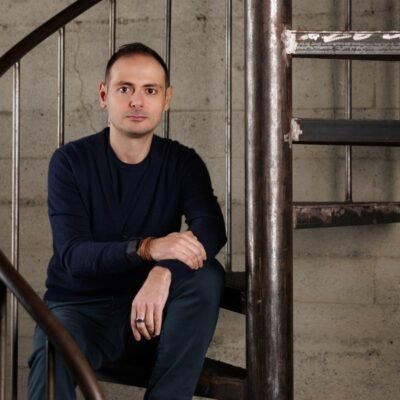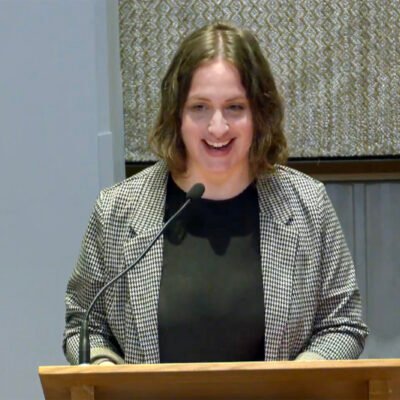SARAJEVO, Bosnia (RNS) — Cantor Igor Bencion Kožemjakin doesn’t always know if he will have a minyan, or quorum of 10 Jews necessary to recite certain prayers in the Jewish liturgical service. But on Shavuot, the Feast of Weeks, which began at sundown Tuesday (June 11), he was pretty certain he would — and so he stocked up on food: cheeses, hummus, smoked salmon, challah and kosher wine.
Kožemjakin leads Sarajevo’s only remaining functioning synagogue, called the Ashkenazi Synagogue, because it was originally designated for Jews of Eastern European descent. The massive, neo-Moorish-style building on the banks of the Miljacka River has seen a decline in attendance. Its physical grandeur has also faded.
But on Shavuot, a holiday that commemorates the revelation of the Torah, Kožemjakin figured he could count on a good showing. About 18 regulars trickled in, in addition to a handful of out-of-town guests. They gathered on the second floor of the synagogue in an ornate room that once served as the women’s section, or balcony. The men took seats in creaky wooden pews on the right side and the women on the left, as is the custom here. They read and chanted the evening prayers from transliterations printed on white sheets of paper, rather than the Hebrew prayerbooks, which many cannot read. Afterward, they noshed along a long table adorned with a white tablecloth in the community room downstairs, some cracking open bottles of Sarjavesko, the local beer.
“Many people are coming to synagogue even though they are not religious at all,” said Kožemjakin, 45, a native of Sarajevo who was trained for the job by the synagogue’s former cantor, or prayer leader. “They might not feel the connection with God. But they might feel a connection with other Jews.”
Sarajevo is sometimes called “little Jerusalem,” because it is a crossroads for many different religions: Muslims, known as Bosniaks, Catholics, Orthodox Christians and Jews. This pluralistic mix has lived side by side (not always harmoniously) for centuries. Today, only a couple of hundred Jews remain.

Sarajevo Jews share a meal following a Shavuot service at Ashkenazi Synagogue in Sarajevo, Bosnia, Tuesday, June 11, 2024. (RNS Photo/Yonat Shimron)
Jews first arrived in Sarajevo after their expulsion in 1492 from Spain by its Roman Catholic rulers. The first recorded mention of Jews in Sarajevo dates back to a 1551 legal document. The first synagogue was built in 1581. Jews thrived in this mostly Muslim enclave, then part of the Ottoman Empire. They worked as traders, tailors, cobblers and later pharmacists, doctors and scholars. They formed choral societies and sports leagues. Ladino, the Jewish-Spanish language, was their mother tongue.
In 1940, there were approximately 14,000 Jews in the region of Bosnia, with about 10,000 in its capital city. In 1941, with the invasion of the Nazis, most were rounded up and deported to concentration camps across Europe.
About 90% were killed during the Holocaust, said Francine Friedman, professor emerita at Ball State University who wrote a definitive history of the Jews of Bosnia.
“A lot of the synagogues were either burned or looted,” Friedman said. “The Ashkenazic synagogue was used as a stable.” (That’s why the synagogue refurbished what was the women’s gallery on the second floor as the main worship space, she said.)
Still, a remnant of Jews survived under Communist Yugoslavia. Many intermarried. They enjoyed good relations with the predominant Muslim Bosniaks as well as the minority Catholic Croats and Orthodox Serbs.
During the 1992-1995 war in Bosnia and Herzegovina, the Ashkenazi Synagogue served as a humanitarian outpost stockpiling food and medicines — not only for the Jewish community but for anyone in need. An old charity started in the 19th century called La Benevolencija was reconstituted at the synagogue and still functions as a social service agency. It receives funding from the Conference on Jewish Material Claims Against Germany, which compensates Holocaust survivors, of which Kožemjakin estimates there are more than 40 still living in Sarajevo.
Kožemjakin greeted these older Jews with hugs and kisses as they entered the synagogue Tuesday evening. His mission: to let them know they belong.
“I do not make any kind of divisions among the Jews,” he said. “Everyone is welcome here regardless of their level of observance.”

The Ashkenazi Synagogue, Sarajevo’s only remaining functioning synagogue. (RNS Photo/Yonat Shimron)
Over the past three years, some 15-17 of the community’s elders died of COVID-19, further diminishing the synagogue’s ranks.
After the Oct. 7 Hamas attack on Israel, and Israel’s punishing, months-long campaign in Gaza, an additional few have stayed away — out of fear.
“Anti-Zionism had exploded into antisemitism,” Kožemjakin said. “I had to cut off relations with some people on social media that I thought were my friends. They accused me of being genocidal because I was mourning for (Israelis) on Oct. 8.”
He now wears a yellow “bring them home” pin on the lapel of his shirt, a symbol of the campaign to bring home hostages kidnapped by Hamas.
But others said they had not personally experienced antisemitism in the wake of Oct. 7.
“Nobody has expressed hatred to me,” said Perla Ovadija Mosca. The 51-year-old video producer was born in Sarajevo and after several years abroad returned in 1999, married and is raising three children here. “I feel comfortable.”
Still, she added: “It’s not easy being Jewish. People may not understand what Israel means to us.”
Mosca said she grew up in a secular Jewish home. Her great-grandmother spoke Ladino, but over the years the family Jewish traditions mainly consisted of celebrating its food on the major holidays.
Still, it’s important for her to transmit a Jewish identity to her children. They did not have a formal bar mitzvah, the right of passage celebrated by 12- and 13-year-old Jewish children, but they attend the synagogue’s Sunday school class, which enrolls 18 (though the cantor said only eight are regulars, including his two children.)
“I respect the tradition,” Mosca said. “And I feel a part of this community.”




